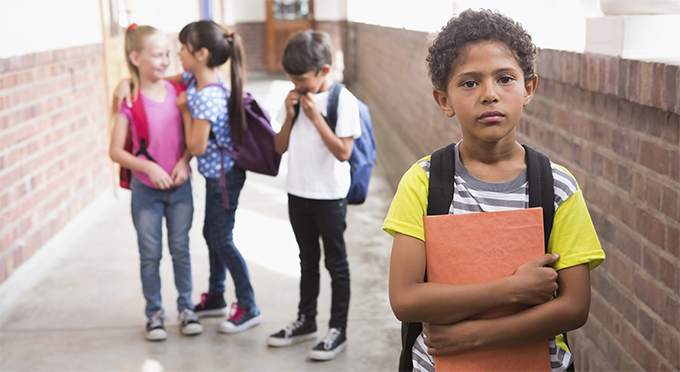
Bullying is one of the biggest concerns parents have for their child’s safety and well-being – and it often leaves many of us stressed and dizzy.
A study conducted by the National Center for Social Research (NatCen) in the UK found that 47% of children reported experiencing bullying at the age of 14. Often the victims are minorities and marginalized groups.
However, the study also found that children who shared these experiences with their parents were more likely to ‘get out’ of bullying . Here are five important ways to help them:
1) Recognize the signs of bullying
Signs of bullying include if your child shows behavioral changes, becomes more introverted, doesn’t want to go to school, or even experiences complications from illness.
If your child reveals that they are being bullied , first thank them for having the courage to tell them. Explain to them that this is an important first step in solving the problem.
Try your best to listen to them without getting irritated or angry. Stay calm and reassure them that you are there to help. Sensitively, ask carefully what happened, what the bullying was like, how they felt after experiencing this, so you can calm them down and begin to empathize with them.
Indeed, you may feel a great temptation to act immediately. But try to think of a solution together with your child. Ask them how best you can help.
The experience of bullying can drop a child’s self-confidence. So, convince them of the advantages they have. Accompany them to do any activity that can ease their anxiety. Always remind them that you will always be there for them.
In many countries, there are also a number of services and platforms that can help provide appropriate advice for parents of victims of bullying .
2) Understand the dynamics of bullying
Bullying is often defined as an intentional and repeated act, which relies on an imbalance of power. But, even if it’s only happened once, you should still take bullying seriously – especially if your child decides to talk about it.
Talk to them about the various forms of bullying , and how they can manifest: it can be not only physical attacks or threats, but also mocking, ostracizing, spreading rumors, to forcing someone to do something they don’t want. Explain to your child that this can also be facilitated by technology and social media (eg through cyberbullying ). Show you understand that bullying can target different individuals and groups with varying intensity.
This can help teach children to recognize and understand bullying as well as demonstrate empathy for others.
We also need to encourage children to always look around them for bullying . The reason is, in many incidents there are eyewitnesses – for example their playing partners – who are reluctant to report for fear of becoming victims or feel bad about “spreading disgrace”.
3) Don’t take revenge
Encourage them not to take revenge aggressively. The will to fight back was understandable. However, this usually tends to make things worse and can cause your child to get hurt, laughed at, or even end up being the one to be punished.
We should prioritize a more assertive approach to dealing with bullying , rather than an aggressive or even passive one. Remind them to get out of the bullying situation as soon as possible and report it to an adult.
4) Report
If your child finds it difficult to deal with bullying even with your help, contact the school immediately. However, make sure you talk to your child first. Explain to them that this is a step that must be taken.
You may wish to confront the parents of the child who abused your child. However, this can have negative consequences for you and your child.
All UK schools , for example, are required by law to have an anti-bullying policy that details how bullying is reported and handled . Ask the school how to do it.
Support and oversee the school during this process, because they both have a goal to stop bullying . Don’t forget to have an initial discussion with your child’s teacher. They may be able to involve other colleagues in helping your child through school resources. Together, develop a strategy for dealing with the incident, including the next steps.
After your child has narrated an incident of bullying , you can also write down in a notebook who the perpetrator was, and what they did or said – and how often, when, and where it happened. Save data or records related to messages or SMS, as well as uploads or comments on social media. But still give the school room to work things out with your child.
However, if you feel that the school is still not doing its best, you may consider reporting to the principal, school committee, local education officer or, in the UK, the Ofsted agency which oversees and regulates the school.
5) Don’t let bullying interfere with your child’s education
No matter how bad the situation, make sure your child doesn’t stop going to school. This can make the situation worse, and it means your child will miss out on education.
Whatever you do, remember that a calm, systematic, gradual response is the best way to deal with bullying .
Bullying is a serious problem in schools and society at large. Bullying is wrong, and we must support schools to create an environment where all children feel safe to thrive and learn.
Author Bio: Mark Heaton is Principal Lecturer, Sheffield Institute of Education at Sheffield Hallam University
